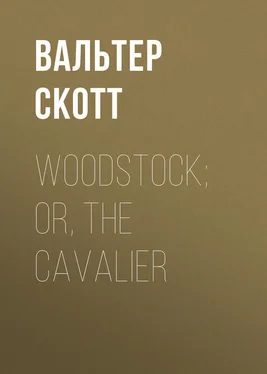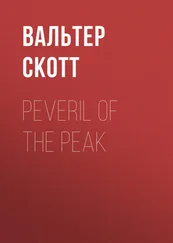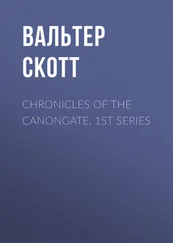Вальтер Скотт - Woodstock; or, the Cavalier
Здесь есть возможность читать онлайн «Вальтер Скотт - Woodstock; or, the Cavalier» — ознакомительный отрывок электронной книги совершенно бесплатно, а после прочтения отрывка купить полную версию. В некоторых случаях можно слушать аудио, скачать через торрент в формате fb2 и присутствует краткое содержание. Жанр: foreign_antique, foreign_prose, Альтернативная история, на английском языке. Описание произведения, (предисловие) а так же отзывы посетителей доступны на портале библиотеки ЛибКат.
- Название:Woodstock; or, the Cavalier
- Автор:
- Жанр:
- Год:неизвестен
- ISBN:нет данных
- Рейтинг книги:5 / 5. Голосов: 1
-
Избранное:Добавить в избранное
- Отзывы:
-
Ваша оценка:
- 100
- 1
- 2
- 3
- 4
- 5
Woodstock; or, the Cavalier: краткое содержание, описание и аннотация
Предлагаем к чтению аннотацию, описание, краткое содержание или предисловие (зависит от того, что написал сам автор книги «Woodstock; or, the Cavalier»). Если вы не нашли необходимую информацию о книге — напишите в комментариях, мы постараемся отыскать её.
Woodstock; or, the Cavalier — читать онлайн ознакомительный отрывок
Ниже представлен текст книги, разбитый по страницам. Система сохранения места последней прочитанной страницы, позволяет с удобством читать онлайн бесплатно книгу «Woodstock; or, the Cavalier», без необходимости каждый раз заново искать на чём Вы остановились. Поставьте закладку, и сможете в любой момент перейти на страницу, на которой закончили чтение.
Интервал:
Закладка:
He started at first, rousing himself with the sensation of one who awakes in a place unknown to him; but the localities instantly forced themselves on his recollection. The lamp burning dimly in the socket, the wood fire almost extinguished in its own white embers, the gloomy picture over the chimney-piece, the sealed packet on the table – all reminded him of the events of yesterday, and his deliberations of the succeeding night. "There is no help for it," he said; "it must be Cromwell or anarchy. And probably the sense that his title, as head of the Executive Government, is derived merely from popular consent, may check the too natural proneness of power to render itself arbitrary. If he govern by Parliaments, and with regard to the privileges of the subject, wherefore not Oliver as well as Charles? But I must take measures for having this conveyed safely to the hands of this future sovereign prince. It will be well to take the first word of influence with him, since there must be many who will not hesitate to recommend counsels more violent and precipitate."
He determined to intrust the important packet to the charge of Wildrake, whose rashness was never so distinguished, as when by any chance he was left idle and unemployed; besides, even if his faith had not been otherwise unimpeachable, the obligations which he owed to his friend Everard must have rendered it such.
These conclusions passed through Colonel Everard's mind, as, collecting the remains of wood in the chimney, he gathered them into a hearty blaze, to remove the uncomfortable feeling of dullness which pervaded his limbs; and by the time he was a little more warm, again sunk into a slumber, which was only dispelled by the beams of morning peeping into his apartment.
He arose, roused himself, walked up and down the room, and looked from the large oriel window on the nearest objects, which were the untrimmed hedges and neglected walks of a certain wilderness, as it is called in ancient treatises on gardening, which, kept of yore well ordered, and in all the pride of the topiary art, presented a succession of yew-trees cut into fantastic forms, of close alleys, and of open walks, filling about two or three acres of ground on that side of the Lodge, and forming a boundary between its immediate precincts and the open Park. Its enclosure was now broken down in many places, and the hinds with their fawns fed free and unstartled up to the very windows of the silvan palace.
This had been a favourite scene of Markham's sports when a boy. He could still distinguish, though now grown out of shape, the verdant battlements of a Gothic castle, all created by the gardener's shears, at which he was accustomed to shoot his arrows; or, stalking before it like the Knight-errants of whom he read, was wont to blow his horn, and bid defiance to the supposed giant or Paynim knight, by whom it was garrisoned. He remembered how he used to train his cousin, though several years younger than himself, to bear a part in those revels of his boyish fancy, and to play the character of an elfin page, or a fairy, or an enchanted princess. He remembered, too, many particulars of their later acquaintance, from which he had been almost necessarily led to the conclusion, that from an early period their parents had entertained some idea, that there might be a well-fitted match betwixt his fair cousin and himself. A thousand visions, formed in so bright a prospect, had vanished along with it, but now returned like shadows, to remind him of all he had lost – and for what? – "For the sake of England," his proud consciousness replied, – "Of England, in danger of becoming the prey at once of bigotry and tyranny." And he strengthened himself with the recollection, "If I have sacrificed my private happiness, it is that my country may enjoy liberty of conscience, and personal freedom; which, under a weak prince and usurping statesman, she was but too likely to have lost."
But the busy fiend in his breast would not be repulsed by the bold answer. "Has thy resistance," it demanded, "availed thy country, Markham Everard? Lies not England, after so much bloodshed, and so much misery, as low beneath the sword of a fortunate soldier, as formerly under the sceptre of an encroaching prince? Are Parliament, or what remains of them, fitted to contend with a leader, master of his soldiers' hearts, as bold and subtle as he is impenetrable in his designs! This General, who holds the army, and by that the fate of the nation in his hand, will he lay down his power because philosophy would pronounce it his duty to become a subject?"
He dared not answer that his knowledge of Cromwell authorised him to expect any such act of self-denial. Yet still he considered that in times of such infinite difficulty, that must be the best government, however little desirable in itself, which should most speedily restore peace to the land, and stop the wounds which the contending parties were daily inflicting on each other. He imagined that Cromwell was the only authority under which a steady government could be formed, and therefore had attached himself to his fortune, though not without considerable and recurring doubts, how far serving the views of this impenetrable and mysterious General was consistent with the principles under which he had assumed arms.
While these things passed in his mind, Everard looked upon the packet which lay on the table addressed to the Lord-General, and which he had made up before sleep. He hesitated several times, when he remembered its purport, and in what degree he must stand committed with that personage, and bound to support his plans of aggrandizement, when once that communication was in Oliver Cromwell's possession.
"Yet it must be so," he said at last, with a deep sigh. "Among the contending parties, he is the strongest – the wisest and most moderate – and ambitious though he be, perhaps not the most dangerous. Some one must be trusted with power to preserve and enforce general order, and who can possess or wield such power like him that is head of the victorious armies of England? Come what will in future, peace and the restoration of law ought to be our first and most pressing object. This remnant of a parliament cannot keep their ground against the army, by mere appeal to the sanction of opinion. If they design to reduce the soldiery, it must be by actual warfare, and the land has been too long steeped in blood. But Cromwell may, and I trust will, make a moderate accommodation with them, on grounds by which peace may be preserved; and it is to this which we must look and trust for a settlement of the kingdom, alas! and for the chance of protecting my obstinate kinsman from the consequences of his honest though absurd pertinacity."
Silencing some internal feelings of doubt and reluctance by such reasoning as this, Markham Everard continued in his resolution to unite himself with Cromwell in the struggle which was evidently approaching betwixt the civil and military authorities; not as the course which, if at perfect liberty, he would have preferred adopting, but as the best choice between two dangerous extremities to which the times had reduced him. He could not help trembling, however, when he recollected that his father, though hitherto the admirer of Cromwell, as the implement by whom so many marvels had been wrought in England, might not be disposed to unite with his interest against that of the Long Parliament, of which he had been, till partly laid aside by continued indisposition, an active and leading member. This doubt also he was obliged to swallow or strangle, as he might; but consoled himself with the ready argument, that it was impossible his father could see matters in another light than that in which they occurred to himself.
CHAPTER THE SEVENTH
Determined at length to dispatch his packet to the General without delay, Colonel Everard approached the door of the apartment, in which, as was evident from the heavy breathing within, the prisoner Wildrake enjoyed a deep slumber, under the influence of liquor at once and of fatigue. In turning the key, the bolt, which was rather rusty, made a resistance so noisy, as partly to attract the sleeper's attention, though not to awake him. Everard stood by his bedside, as he heard him mutter, "Is it morning already, jailor? – Why, you dog, an you had but a cast of humanity in you, you would qualify your vile news with a cup of sack; – hanging is sorry work, my masters – and sorrow's dry."
Читать дальшеИнтервал:
Закладка:
Похожие книги на «Woodstock; or, the Cavalier»
Представляем Вашему вниманию похожие книги на «Woodstock; or, the Cavalier» списком для выбора. Мы отобрали схожую по названию и смыслу литературу в надежде предоставить читателям больше вариантов отыскать новые, интересные, ещё непрочитанные произведения.
Обсуждение, отзывы о книге «Woodstock; or, the Cavalier» и просто собственные мнения читателей. Оставьте ваши комментарии, напишите, что Вы думаете о произведении, его смысле или главных героях. Укажите что конкретно понравилось, а что нет, и почему Вы так считаете.












